Several of the writers I discuss below were poets, so you’d expect that their work would suffer in translation. Perhaps you aren’t interested in reading modern Russian poets in translation. You may find, however, that their lives are interesting, and that a series of brief lives teaches us something about Russian history in the 20th century. The writers I discuss experienced much, and suffered much. The challenges they faced are of a different order of magnitude than those that we face. We number our casualties in dozens, they numbered theirs in tens of millions, though their population was smaller than ours.
In a recent issue, I discussed British writers, and wrote, “In conclusion, Forster says that some fine literature was created between the wars. And indeed, I’m astonished at how many good books emerged from Britain in these decades.” Likewise, when we look at modern Russian literature, we find an astonishing amount of quality work, much of it by writers who are little known outside Russia.
Vasily Grossman was born into a Jewish family in Ukraine in 1905. He lived through the Polish-Soviet War (1919-1921), the Russian Civil War (1917-1922), the Ukrainian famine, Stalin’s purges, Nazi atrocities, and two world wars. Grossman died in 1964, at the age of 58.
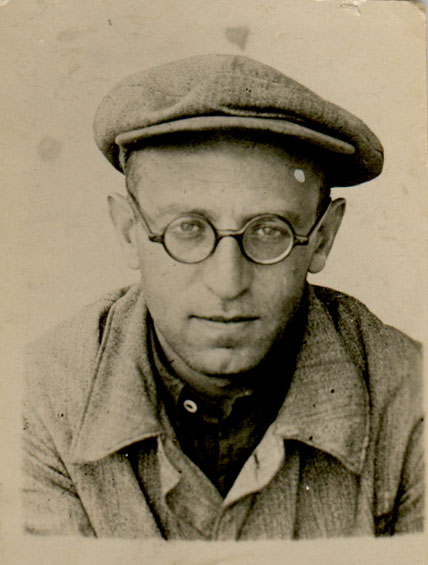
Vasily Grossman
Grossman’s early story “In the Town of Berdichev” brought him to the attention of Maxim Gorky, Isaac Babel, etc. “Maxim Gorky considered this brief story one of the best about the [Polish-Soviet War] and encouraged the young writer to dedicate himself to literature.”1 It’s an impressive story, and enjoyable to read. Grossman was influenced by Chekhov, and he has Chekhov’s sweetness and modesty, Chekhov’s gift for detail. Grossman’s step-son tells us, “I often saw Grossman reading his black volumes of Tolstoy and his red volumes of Dostoyevsky, but the writer he loved most of all was Chekhov.”2
The Grossman scholar Robert Chandler says that Grossman’s late stories are his best. But I didn’t think that the late story “The Road” was as good as “In the Town of Berdichev.” The animal theme struck me as an ineffective imitation of Chekhov. “The Road” does, however, show how the German invasion of Russia was slowed by rain and mud, then stopped by snow and cold.
Isaac Babel is reported to have said, “Believe me, I’ve now learned to watch calmly as people are shot.” Grossman called these “insane words,” he said he pitied Babel, and he asked “What had happened to his soul?” Brutality was Babel’s métier, but it wasn’t Grossman’s. Babel was “fascinated by violence and power,”3 and he socialized with Nikolay Yezhov, head of the secret police (NKVD).
Jews were oppressed under the Czar, and became more prominent under the Soviet regime. “In the early Soviet Union [Jews] constituted a disproportionately large part of the political, professional, and intellectual elite.”4 This may be one reason why Jewish-Russian writers, like Grossman, supported the Soviet regime, for a time. Wikipedia speaks of Grossman’s “loyal support of the Soviet regime” until after World War II. Grossman probably blamed the Soviet regime for the famine of the 1930s, and for the purges of the 1930s, but these events receded into the background when the Germans invaded the Soviet Union.
After World War II, Jewish doctors were accused of plotting against Soviet leaders, and the “Doctors’ Plot” led to persecution of the Jews. Stalin seemed to be using anti-Semitism to unite the country, and build support for the regime.
Along with other Jewish writers, Grossman signed a letter calling for the execution of the Jewish doctors. He immediately regretted signing the letter. “This act of betrayal... haunted Grossman for the rest of his life.”5 When his life was ebbing away, he woke up one day in the hospital and, still half asleep, said “They took me off for interrogation during the night. I didn’t betray anyone, did I?” In his writings, Grossman described the pressure to betray. “No one has articulated more clearly how hard it is for an individual to withstand the pressure of a totalitarian State.”
The Soviet regime denied the Holocaust, or at least downplayed it; they insisted that all Soviet citizens suffered and died, their motto was “Don’t divide the dead.” Meanwhile, Grossman had spent years documenting the Holocaust in a work called The Black Book. The Soviet regime had initially supported this project as a way of arousing anti-German feeling around the world. But after World War II, with the Soviet regime turning toward anti-Semitism, Grossman’s Black Book was suppressed, and Grossman’s hostility to the regime intensified. Eventually Grossman equated Stalinism with Nazism.
Grossman had little interest in Jewish history and culture.6 Perhaps it was only Nazi and Soviet anti-Semitism that made him feel Jewish. Like many Jewish-Russians, Grossman felt himself to be Russian rather than Jewish. Pasternak, who was also Jewish, was criticized in Israel for advocating assimilation. Pasternak said, “I am above race.” Joseph Brodsky’s Jewishness was described as “very thin and entirely secular.”7 Brodsky didn’t want to emigrate to Israel.
During World War II, Grossman became a celebrated war correspondent, covering the battles of Stalingrad, Kursk, Berlin, etc. While other journalists kept a distance from the battle, Grossman went to the front lines, “astonishing everyone with his courage, tenacity, and physical endurance.” On several occasions, Grossman narrowly escaped death; he was dubbed “Lucky Grossman.” Newspapers with Grossman’s articles were passed among Soviet soldiers until the newspaper was in tatters. The British historian Antony Beevor edited a volume of Grossman’s war reporting, A Writer at War: Vasily Grossman with the Red Army, 1941-1945. Grossman’s account of the Treblinka concentration camp was one of the first accounts of a Nazi camp.
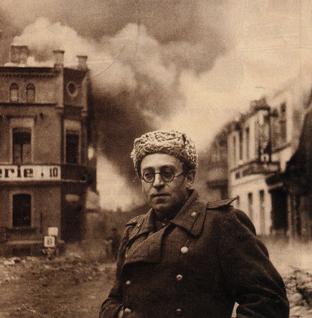
Grossman in Germany during World War II
Before the Holocaust began, before Auschwitz was built, there was a kind of preliminary Holocaust in Ukraine and nearby areas. This is sometimes called the “Shoah by bullets,” as opposed to the later “Shoah by gas.” On September 15, 1941, just a few months after Germany invaded Russia, around 15,000 Jews were shot in Grossman’s hometown of Berdichev, Ukraine. One of those who was shot was Grossman’s mother. Later in September, 1941, about 34,000 Jews from Kiev were massacred at a ravine called Babi Yar. Grossman was one of the first journalists who wrote about the “Shoah by bullets.”8
Grossman’s two chief novels, Life and Fate and Everything Flows, were written late in his career, had an anti-Soviet viewpoint, and were suppressed during the Khrushchev era.9 Grossman wrote to Khrushchev:
| What is the point of me being physically free when the book I dedicated my life to is arrested... I am not renouncing it... I am requesting freedom for my book.... I have written in my book what I believed, and continue to believe, to be the truth. I have written only what I have thought through, felt through and suffered through. |
When Grossman died in 1964, Life and Fate and Everything Flows were still banned, still unpublished. They were finally published in 1988, during the Gorbachev era.
Life and Fate is partly autobiographical, reflecting Grossman’s feelings about the murder of his mother by the Nazis. “The late novel Everything Flows [is] especially noted for its quiet, unforced, and yet horrifying condemnation of the Soviet totalitarian state.”
Grossman blamed himself for not getting his mother out of Ukraine before the Nazis came in. After his mother died, he wrote her two letters, which he carried with him for the rest of his life. In the first letter, dated September 15, 1950, he wrote,
| During these nine years.... my feelings for you have not diminished by one iota; I have not forgotten you and I have not found any consolation. Time has not healed me.... It seems to me that my love and this terrible grief will never change until the end of my days. |
In the second letter, dated September 15, 1961, Grossman wrote,
| It is now twenty years since your death. I love you, I remember you every day of my life, and through all these twenty years this grief has been constantly with me.... Today, as I have done so often during these years, I have been re-reading the few letters that still remain from among the many hundreds that I received from you.... There is nothing I fear, because your love is with me and because my love is eternally with you. |
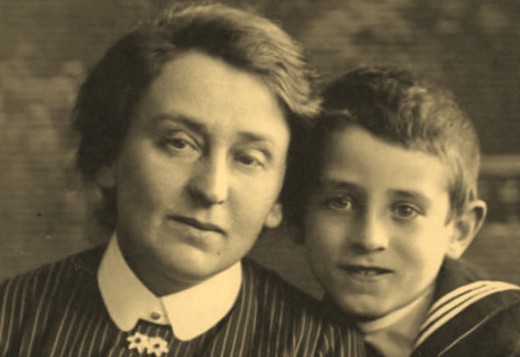
Grossman and his mother
At the time of his mother’s death, Grossman dreamed that he entered a room, and saw a chair where his mother had just been sitting. It was empty, and Grossman had a hunch his mother had died. He had this dream more than two years before he had any definite information about his mother.
Grossman’s mother anticipated her untimely death, and wrote, “I do not expect to live a long life. I’m expecting something to sneak up on me from a dark corner.”
Grossman was married twice, and had one daughter. When his second wife was arrested by the NKVD, in 1937, Grossman dared to write a letter to the head of the NKVD; his wife was released.
Mikhail Sholokhov was born in 1905, the same year Grossman was born. Sholokhov was born into a working-class family that lived near the Don River, in “the land of the Cossacks.” Sholokhov wrote about this region in his magnum opus, And Quiet Flows the Don, a novel set in the tumultuous period between 1915 and 1930. This novel earned Sholokhov a Nobel Prize in 1965.
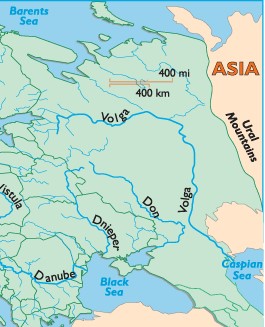
Map of the Don River, with the Dnieper River to the west,
and the Volga River to the east. The Dnieper flows into the Black Sea,
the Don into the Sea of Azov, and the Volga into the Caspian Sea
Sholokhov took up arms at the age of 13, fighting for the Bolsheviks in the Civil War. He began writing at 17, and published at 18. When he was 21, he published a collection of short stories, Tales from the Don.
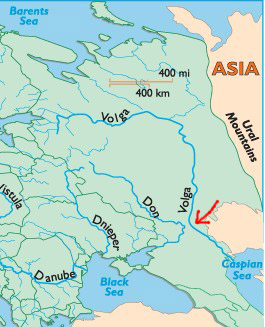
|
| The Germans drove past the Dnieper, past the Don, and were finally stopped at Stalingrad on the Volga (red arrow). Stalingrad was originally called Tsaritsyn, and is now called Volgograd. Since the Volga is near the Don at Stalingrad, a canal was dug at this point to connect the two rivers. The canal was completed in 1952, a year before Stalin’s death. Stalin kept 100,000 Gulag slaves working on the canal project. |
When Sholokhov was 25, he met Stalin. At this time, Sholokhov was doubtless a prominent literary figure. He won Stalin’s regard in a way that few people ever did. Was Stalin won over by Sholokhov’s reputation, his popularity as a writer? Or was he won over by Sholokhov’s writings — was he a fan of Sholokhov’s writings? Or was there something in Sholokhov’s personality that Stalin responded to?
Soon after meeting Stalin, Sholokhov joined the Communist Party, and was given a seat on the Supreme Soviet. He spoke openly with Stalin, telling him about famine in the countryside, acts of brutality by the NKVD, etc. After Stalin’s death, Sholokhov remained an “insider,” and accompanied Khrushchev on a visit to the U.S.
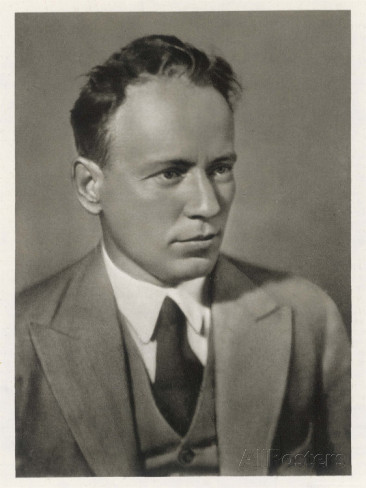
Mikhail Sholokhov
According to Grossman’s step-son, Fyodor Guber, Grossman “admired the first two volumes of [And Quiet Flows the Don] but he had a low opinion of Sholokhov’s later work.”10
At least two of Sholokhov’s works became popular films: a short story called “The Fate of a Man,” and a short story called “Nakhalyonok,” which draws on the author’s childhood, and is part of Tales from the Don.
Sholokhov lambasted Solzhenitsyn’s early novella, One Day in the Life of Ivan Denisovich.10B Later Solzhenitsyn accused Sholokhov of plagiarizing And Quiet Flows the Don.
Sholokhov died in 1984.
Another writer who had a good relationship with Stalin was Mikhail Bulgakov. Stalin was fond of Bulgakov’s play, The Days of the Turbins, and saw it repeatedly. Later, however, Bulgakov’s writings were banned, so he wrote to Stalin, and asked permission to emigrate. Stalin called him on the phone, and asked if he really wanted to leave the Soviet Union. Difficult question! If Bulgakov said “yes” he could be charged with disloyalty. So “Bulgakov replied that a Russian writer cannot live outside of his homeland.” Stalin had a penchant for “telephone terrorism,” as we’ll see later when we discuss Pasternak.

Mikhail Bulgakov
Bulgakov is best known for his novel The Master and Margarita.10C According to Wikipedia, Bulgakov’s satires are “a skillful blending of fantastic and realistic elements, grotesque situations, and a concern with important ethical issues.” Bulgakov was a fan of H. G. Wells, and some of Bulgakov’s works are classed as science fiction.
Like Chekhov, Bulgakov was a doctor. Serving as a doctor in World War I, he was badly injured, took morphine for pain-relief, and became addicted to morphine. Bulgakov died at 48 of kidney disease.
Grossman had a special fondness for the writer Andrei Platonov, who was one of his contemporaries. Grossman’s step-son tells us that he “always spoke with passionate enthusiasm about the work of his friend Andrei Platonov.”11 Platonov’s major works are the novels Foundation Pit and Chevengur.12 Foundation Pit is about workers who spend their time and energy digging a hole that seems to have no purpose. It’s described as a dystopian novel, comparable to Orwell’s Nineteen Eighty-Four.
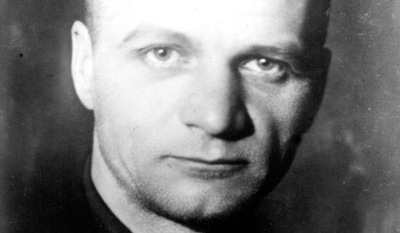
Andrei Platonov
Platonov was born into a working-class family, attended elementary school, then started working at 13. Like Sholokhov, he began writing while still a teenager. By the time he was 20, he was publishing poems, stories, and articles on various subjects. By the time he was 30, he had written his two major novels. His novels were critical of the Soviet system, and were suppressed. Foundation Pit wasn’t published until 1987.13
Platonov’s son was arrested and sent to the Gulag at age 15. In the Gulag, he contracted tuberculosis. When he was released, Platonov nursed him, and caught the disease himself. This probably explains why Platonov wrote little after age 40, and died in 1951, at age 52. Grossman spoke at his funeral.
“Why would a 15-year-old be sent to the Gulag?” Perhaps because Stalin wanted millions of slaves for his public-works projects, and he preferred people who were young and strong; the NKVD had arrest-quotas, and they arrested people on any pretext. Or perhaps Platonov’s son was overheard making a politically-incorrect remark.
Like Grossman, Ilya Ehrenburg was born into a Jewish family in Ukraine. Like Grossman, Ehrenburg worked as a journalist, covering World War I, the Spanish Civil War, and World War II. Ehrenburg also wrote novels, travel books, poetry, and a multi-volume autobiography called People, Years, Life. Ehrenburg collaborated with Grossman on The Black Book.
As a teenager, Ehrenburg became a Bolshevik. In 1908, at age 17, he was arrested by the Czar’s police, and jailed for five months. Exiled from Russia, he spent several years in Paris. In Paris, Ehrenburg initially moved in Bolshevik circles, met Lenin, and was friends with Bukharin. Then he left The Party, and began to move in bohemian circles; he met Picasso, Modigliani, etc.
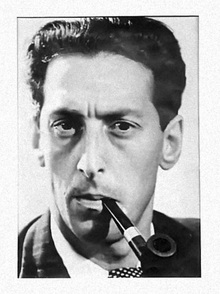
Ilya Ehrenburg
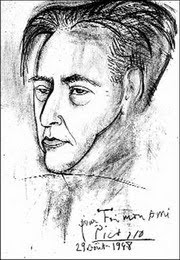
Picasso’s portrait of Ehrenburg
After Stalin’s death, Ehrenburg wrote a satirical novel about Stalin called The Thaw. Some of Ehrenburg’s works have “a distinctly Marxist-Leninist ideological flavor.”14 According to Wikipedia, Ehrenburg “disapproved of the Russian and Soviet intellectuals who had explicitly rejected Communism or defected to the West.”
Ehrenburg died in 1967, at the age of 76.
One of the best-known Russian writers in the 20th century was Boris Pasternak, who won a Nobel Prize in 1958 for Doctor Zhivago. Pasternak was born in 1890 into a wealthy family of assimilated Jews. His father was a noted painter, his mother a concert pianist. His parents were friends and disciples of Tolstoy. Another family friend was the Austrian writer Rilke.
The young Pasternak’s first ambition was to be a musician, then he turned to philosophy, and studied philosophy in Germany. Finally he found his calling as a writer of poetry and fiction.
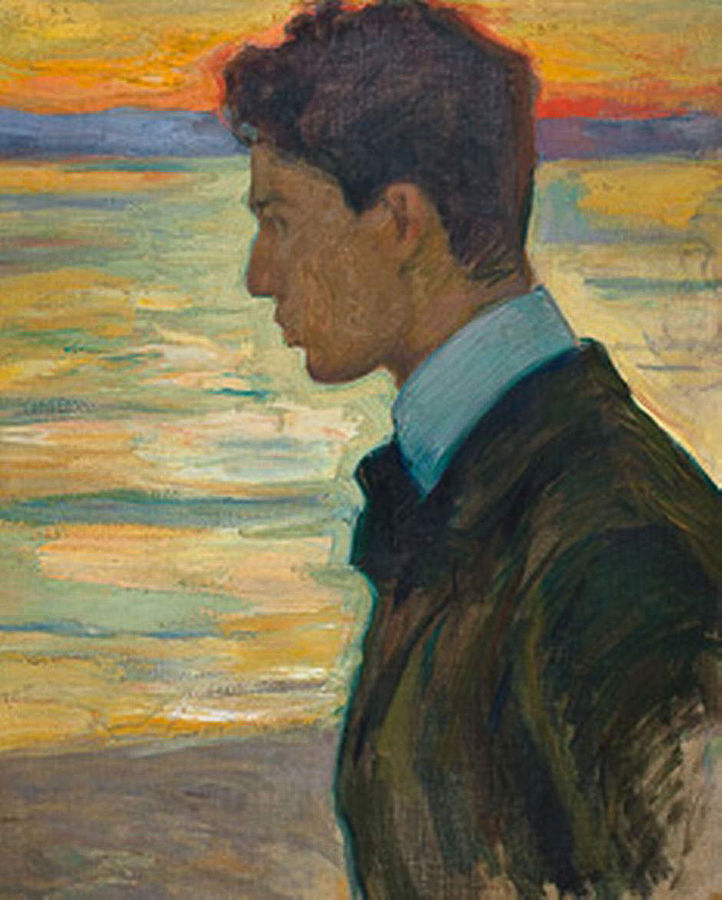
Pasternak as a young man, painted by his father
After the Russian Revolution, Pasternak remained in Moscow, though many of his family and friends went abroad. Initially he had a certain admiration for the Bolsheviks, an admiration that didn’t last long.
At 27, Pasternak published a volume of poetry called “My Sister, Life” which Wikipedia calls “one of the most influential collections ever published in the Russian language.” A few years later, Pasternak was involved in a famous correspondence with Rilke and Marina Tsvetaeva; this correspondence was published in book form. Pasternak made many translations — Shakespeare, Goethe, Rilke, etc.
In 1934, Pasternak’s friend Osip Mandelstam was arrested.15 Mandelstam was a prominent poet who had dared to satirize Stalin. Pasternak tried to get Mandelstam released. A few days after Mandelstam’s arrest, the phone rang in Pasternak’s apartment.
| A voice from The Kremlin said, “Comrade Stalin wishes to speak with you”.... Pasternak was struck dumb. “He was totally unprepared for such a conversation. But then he heard his voice, the voice of Stalin, coming over the line. The Leader addressed him in a rather bluff uncouth fashion, using the familiar thou form: ‘Tell me, what are they saying in your literary circles about the arrest of Mandelstam?’”
Flustered, Pasternak denied that there was any discussion or that there were any literary circles left in Soviet Russia. Stalin went on to ask him for his own opinion of Mandelstam. In an “eager fumbling manner” Pasternak explained that he and Mandelstam had completely different philosophies about poetry. Pasternak “went on for quite a time in this vein. Stalin gave him no encouragement whatsoever, not interjecting, or uttering a sound of any kind. At last [Pasternak] came to a halt. Stalin then said, in a mocking tone of voice: ‘I see, you just aren’t able to stick up for a comrade,’ and put down the receiver.” [Pasternak] was horrified at how the conversation had ended. He repeatedly telephoned the Kremlin, begging to be reconnected to Stalin. Instead, Pasternak was told, “Comrade Stalin is busy.” Pasternak became frantic, pacing around his apartment, repeating over and over that he must write to Stalin to explain what he had meant, and to also say that injustices were being committed in the name of the Leader. Pasternak later did write and send just such a letter.16 |
This episode shows how Stalin manipulated people, terrorized people. First he calls Pasternak out of the blue, catches him unprepared. Then he asks a very difficult question. If Pasternak answers honestly, and says that he disapproves of Mandelstam’s arrest, he might be arrested himself, and spend the rest of his life in the Gulag, or be shot. Then Stalin keeps silent, while Pasternak wrestles with this difficult question. Then Stalin mocks him for betraying a friend. Then Stalin hangs up, giving Pasternak no chance to clarify himself or defend himself or appeal for Mandelstam’s release. Then Stalin refuses to speak to Pasternak again, leaving Pasternak deeply upset.
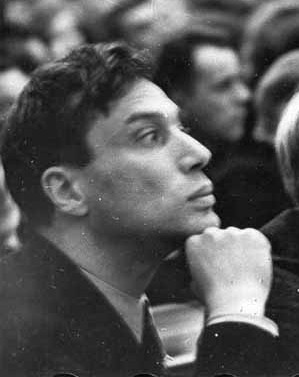
Pasternak at 44, attending a Congress of Soviet writers
During the purges of the 1930s, the Writers’ Union asked all its members to sign a letter supporting the execution of certain generals. Pasternak refused to sign. The head of the union, fearing that he himself would be punished, went to Pasternak’s home, with the other leaders of the union, and urged him to sign. Pasternak still refused to sign. His wife, who was pregnant, begged him to sign, accusing him of destroying the family. Still he refused.
That night, he and his wife expected to be arrested. Later they learned that an NKVD agent was hiding outside their window, noting everything they said. Soon after, Pasternak wrote to Stalin, spoke of his family’s Tolstoyan beliefs (non-violent beliefs), and said that his own life was at Stalin’s disposal.
It is said that Stalin once crossed Pasternak’s name off a list of people to be executed, saying “Don’t touch that holy fool!” or “Leave that cloud-dweller alone!”
After World War II, any traces of pro-Soviet feeling that Pasternak still had were obliterated by new purges. Soviet troops who had been captured by the Germans were sent to the Gulag (perhaps Stalin thought they had been infected by Western ideas). Émigrés who had once supported the White Army, and were promised amnesty if they returned, were sent to the Gulag. As a result of the “Leningrad Affair,” Stalin purged many communist leaders from Leningrad (St. Petersburg), whom he seemed to view as rivals (Stalin himself was based in Moscow). Ethnic groups that Stalin mistrusted were sent to the Gulag en masse.
After Stalin died in 1953, many prisoners were released from the Gulag, and censorship of literature was relaxed; this period is sometimes called the “Khrushchev Thaw.”
Pasternak married at 32. At 42, he was divorced, and married again. At 56, he started an affair with a woman named Olga Ivinskaya. A few years later, Olga was arrested and interrogated, but didn’t incriminate Pasternak; she was sent to the Gulag. She had been pregnant with Pasternak’s child, but had a miscarriage in the Gulag. After she had spent a few years in the Gulag, Olga was released as a result of Stalin’s death; she and Pasternak resumed their relationship.
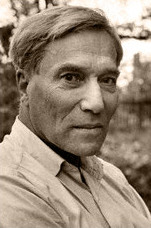
Pasternak in his later years
Pasternak finished Doctor Zhivago in 1956, but it was rejected by Soviet publishers. Pasternak managed to publish it in Italy, skirting Soviet censors. The Soviet government was furious, and forced Pasternak to send a telegram to the Italian publisher, withdrawing his manuscript. But Pasternak also sent a secret letter, telling the publisher to ignore the telegram.
Doctor Zhivago created a sensation, partly because of the Soviet effort to stifle it, and the American effort to promote it. It was soon translated into English, and spent months on the bestseller list. It was circulated in the Soviet Union in manuscript form — passed from reader to reader (samizdat). It wasn’t published in the Soviet Union until 1988.
Doctor Zhivago is an epic novel about Russia in the 20th century. One of Pasternak’s friends told him, “Don’t forget yourself to the point of believing that it was you who wrote this work. It was the Russian people and their sufferings who created it.” Doctor Zhivago might be called Pasternak’s magnum opus, his life’s work; parts of it were written forty years before it was published.
Pasternak received the Nobel Prize for Doctor Zhivago. He also received a chorus of criticism inside the Soviet Union. Several writers were forced to criticize him in public speeches. One of these writers, Boris Slutsky, was “so tormented by his anti-Pasternak speech that he later went insane.”17 All this criticism drove Pasternak “to the brink of suicide.” Pasternak knew that, if he traveled to Sweden to receive the Prize, he might not get back into the Soviet Union. He declined the Prize.18
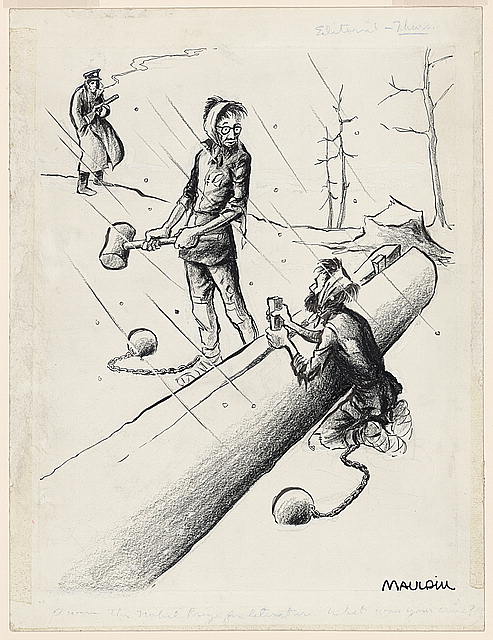
“I won the Nobel Prize for literature. What was your crime?”
cartoon from 1959
Pasternak died of cancer in 1960. As he was dying, he received the last rites from a Russian Orthodox priest; in his earlier years, he sometimes attended the Russian Orthodox Church.
One of Pasternak’s literary friends was the poet Marina Tsvetaeva. As I mentioned earlier, Pasternak, Marina, and Rilke had a three-way correspondence, which was later published. When Marina had a son, she wanted to name him Boris (after Pasternak), but her husband nixed the idea. Pasternak’s life is a story of survival and victory, Marina’s a story of defeat and tragedy.

Marina Tsvetaeva, age 33
Marina was born in Moscow in 1892, two years after Pasternak. Her father was a professor, her mother a concert pianist. Her mother insisted that Marina study music, and discouraged her poetic aspirations; there were tensions in the family. Marina later wrote, “With a mother like her, I had only one choice: to become a poet.” Part of her youth was spent in Italy and Switzerland; she learned several languages. At 16, she became a literature student at the Sorbonne. She was attracted to Russian Symbolist poets like Andrei Bely and Alexander Blok.
At 19, Marina married a young officer. They had two daughters. Marina had several affairs, including one with the poet Osip Mandelstam, and one with the poetess Sofia Parnok. After the Russian Revolution, Marina endured famine in Moscow, while her husband fought for the White Army in the civil war. Marina put her two daughters in an orphanage, thinking they would have more food there; one died of hunger.
In the early 1920s, Marina lived with her husband and daughter in Prague and Paris. Often they were penniless, and ate horsemeat, if they could get any meat. Marina had a son. She didn’t feel welcome in Paris, where she was treated coldly by the Russian émigré community; the émigrés thought that Marina and her husband weren’t sufficiently anti-Soviet. Both Marina and her husband contracted tuberculosis.
Her husband missed his native land, became pro-Soviet, and began working for the NKVD. He was wanted by the French police for the murder of a Russian defector; he was also suspected in the murder of Trotsky’s son. In 1937, Marina’s husband evaded the French police, and returned to the Soviet Union. Now Marina was completely ostracized by the émigré community, which knew that her husband was an NKVD agent. So in 1939, Marina and her son returned to the Soviet Union (her daughter had returned a few years before).
In the Soviet Union, “anyone who had lived abroad was suspect, as was anyone who had been among the intelligentsia before the Revolution.”19 So Marina and her family lived under a cloud of suspicion. Marina’s former friends and literary connections avoided her.
Her daughter had a boyfriend who became a fiancé, but this fiancé was actually an NKVD agent, whose job was to spy on Marina’s family. Marina’s husband and daughter were arrested; her husband was later shot, her daughter (Alya) spent eight years in the Gulag. Her husband was shot by the NKVD despite having worked for the NKVD, despite having committed murder for the NKVD!
In 1941, when the Germans invaded, Marina and her son, along with many Moscow intellectuals, were deported to a city further east. Marina found herself with no means of support, and she hung herself. She left a note for her son:
| Forgive me, but to go on would be worse. I am gravely ill [with tuberculosis], this is not me anymore. I love you passionately. Do understand that I could not live anymore. Tell Papa and Alya, if you ever see them, that I loved them to the last moment and explain to them that I found myself in a trap. |
Pasternak blamed himself for Marina’s death, and said it was one of his greatest heartbreaks.
Anna Akhmatova was born in 1889, one year before Pasternak. Like Marina, Anna is known for poetry of a modernist type. But she was better known than Marina — more popular as a writer, more prominent socially. Wikipedia says she was “renowned, not so much for her beauty, as her intense magnetism and allure, attracting the fascinated attention of a great many men.” At six feet tall, Anna turned heads wherever she went. Pasternak was one of the men who fell under Anna’s spell; he repeatedly proposed to her, though he was married at the time. Anna’s love poetry was as fascinating to women as her presence was fascinating to men. She often gave public readings in St. Petersburg. She was dubbed “The Queen of the Neva.”

painting by Kuzma Petrov-Vodkin
Both of Anna’s parents were from the Russian nobility. One of her ancestors was Khan Akhmat, hence she took the pen name Akhmatova. Khan Akhmat was a Mongol/Tatar, the last Mongol ruler of Russia, and a descendant of Genghis Khan, so Anna was descended from Genghis Khan.
Anna grew up in St. Petersburg and Kiev. Married at 21, she went to Paris on her honeymoon, where she met the artist Modigliani. Anna and her husband had a son, then separated soon afterwards. Anna returned to Paris alone, staying several months. She had an affair with Modigliani, and he made “at least 20 paintings” of her. She wrote poems about their love.
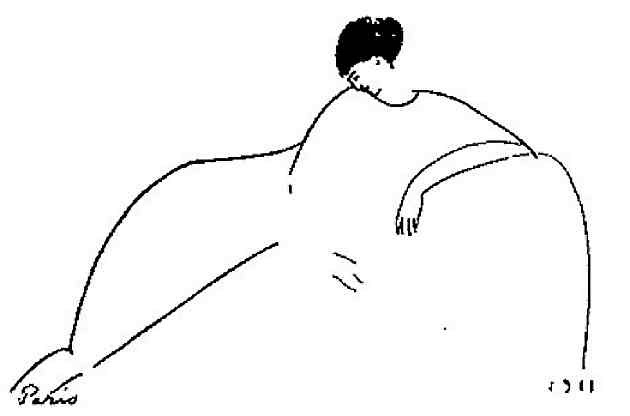
drawing of Anna Akhmatova by Modigliani, 1911
Anna seemed to possess a gift of intuition, a psychic ability. She said,
| What most fascinated [Modigliani] about me was my ability to read other people’s thoughts, to dream other people’s dreams, and a few other things of which everyone who knew me had long since been aware. |
We saw earlier how Grossman’s mother anticipated her untimely death. Anna once said, “the future... announces its coming long before it arrives.”20 In July 1914, on the brink of World War I and the Russian Revolution, Anna wrote “Frightening times are approaching / Soon fresh graves will cover the land.”21
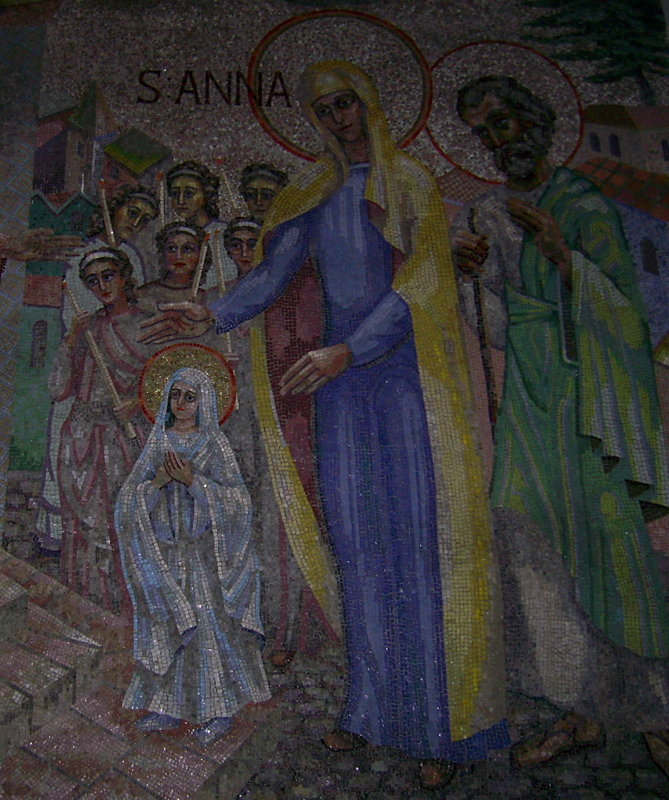
Anna was the muse for mosaic artist Boris Anrep
In this mosaic in Ireland,
Anrep has used Akhmatova as a model for Saint Anne
and changed “Anne” to “Anna”
Like Pasternak, Akhmatova remained in Russia when many of her friends left for Europe. When Boris Anrep went to England, she wrote,
You are a traitor, and for a green island,
Have betrayed, yes, betrayed your native Land,
Abandoned all our songs and sacred Icons,
And the pine tree over a quiet lake.
One of her best-known poems is Requiem, which depicts “the suffering of the common people under Soviet terror.” In Requiem, Anna “took on the public role as chronicler of the Terror.” Her magnum opus is probably the long Poem Without A Hero, which deals with the siege of St. Petersburg, etc. Anna worked on Poem Without A Hero for some twenty years.
Like Pasternak, Anna often translated foreign poetry, perhaps because translations were less likely to be censored than original works. She also wrote literary criticism — essays on Pushkin, Dostoyevsky, etc.
In 1921, Anna’s former husband, and the father of her son, was shot by the NKVD, accused of plotting against the Soviet regime. Since Anna and her son were connected to this “enemy of the state,” they too were under suspicion. Anna’s son was arrested and sent to the Gulag. Anna would stand in line for hours to plead for her son’s release, or bring him packages of food.
Seventeen months I’ve pleaded
for you to come home.
Flung myself at the hangman’s feet....
Now all’s eternal confusion.
Who’s beast, and who’s man?
How long till execution?
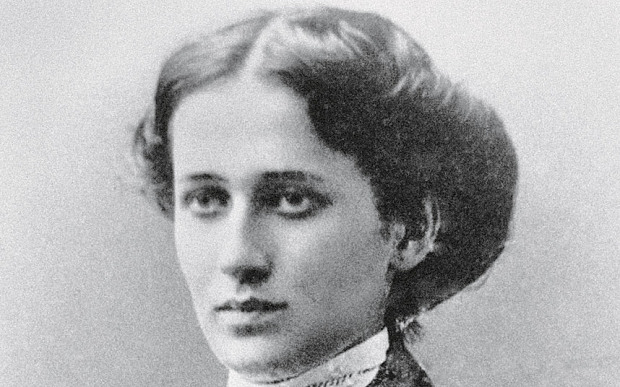
Anna Akhmatova
Living under suspicion, prevented from publishing, her home wiretapped, Anna developed her own method of publishing. She would write a few lines of poetry on a scrap of paper, and pass it to a friend, who would memorize it. Anna would say something like, “How early the autumn came this year,” for the benefit of anyone listening. Then Anna would burn the paper.22 One of her friends later said, “It was like a ritual: Hands, matches, an ashtray. A ritual beautiful and bitter.” Eventually the secret police accumulated 900 pages of material on Anna.
Hoping to get her son released from prison, Anna wrote numerous poems in support of Stalin’s regime, but she didn’t include these poems in her Collected Works. When her son was finally released in 1956, he was embittered, and blamed her for not doing enough to win his release.
In 1945, Isaiah Berlin visited Anna’s apartment:
| It was very barely furnished — virtually everything in it had, I gathered, been taken away — looted or sold — during the siege [of St. Petersburg]. A stately, grey-haired lady, a white shawl draped about her shoulders, slowly rose to greet us. Anna Akhmatova was immensely dignified, with unhurried gestures, a noble head, beautiful, somewhat severe features, and an expression of immense sadness. |
In her last years, she was acclaimed at home and abroad, and traveled to Europe to receive a prize and an honorary degree. Anna Akhmatova died in 1966, at the age of 76.
Joseph Brodsky was a protégé of Anna Akhmatova. Brodsky was born in 1940 into a Jewish family, “a prominent and ancient rabbinic family.”23 When Brodsky was a toddler, his family came near starvation as a result of the siege of St. Petersburg (the same siege that Anna wrote about in Poem Without A Hero). One of Brodsky’s aunts died of starvation. The experience of near-starvation left Brodsky with lasting health problems.23B
Brodsky was an “unruly child,” and left school at 15. He worked at a variety of jobs and educated himself. He taught himself Polish in order to translate Czeslaw Milosz, and English in order to translate John Donne. He published poems in underground journals, and became known in literary circles. At 20, he met Anna Akhmatova.
When Brodsky was 23, his poetry was denounced by a St. Petersburg newspaper as “pornographic and anti-Soviet.” “His papers were confiscated, he was interrogated, [and] twice put in a mental institution.... He was charged with social parasitism.”24 The authorities said that “his series of odd jobs and role as a poet were not a sufficient contribution to society.” The judge asked him, “Who has recognized you as a poet? Who has enrolled you in the ranks of poets?” “No one,” Brodsky replied, “Who enrolled me in the ranks of the human race?” “I’m no parasite,” Brodsky said. “I’m a poet, who will bring honor and glory to his country.” Brodsky was sentenced to five years hard labor, and sent to a farm north of St. Petersburg. He had his own cottage, read poetry in the evening, and received visits from friends. This wasn’t the Gulag of Stalin’s day.
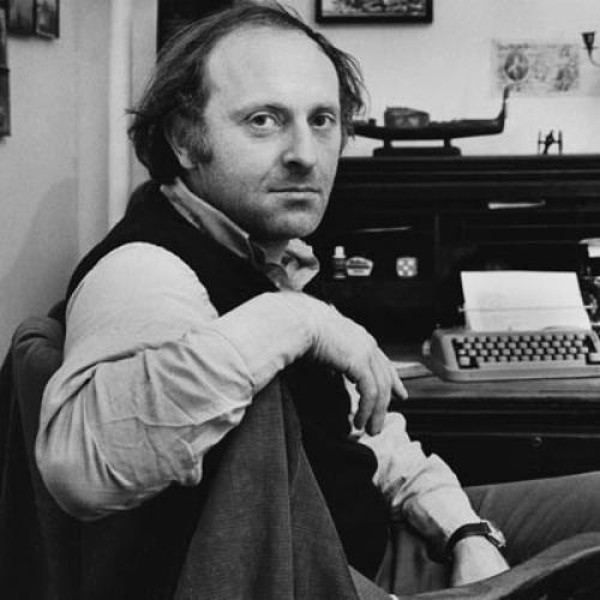
Joseph Brodsky
Meanwhile, the transcript of Brodsky’s trial had made its way to the West, and Brodsky had become a cause célèbre. Sartre and others were demanding his release from “prison.” At 25, Brodsky was released, and began publishing in the West. At 31, he was invited to emigrate to Israel, but he chose to remain in the Soviet Union. In 1972, at age 32, Brodsky was put on a plane to Vienna, and sent into exile. He never returned to Russia.
He settled in the U.S., taught at several American universities, and was lauded for his literary criticism as well as his poetry. He called himself a Russian poet and an English essayist. In 1987, he won the Nobel Prize. He became Poet Laureate of the U.S. He noticed that poetry wasn’t as popular in the U.S. as it was in Russia. “He suggested that inexpensive anthologies of the best American poets be made available in hotels and airports, hospitals and supermarkets.”
Though Brodsky often translated his own poems into English, still much was lost in translation. Isaiah Berlin said, “How could anyone who had not read [Brodsky] in Russian understand him by his English poems? ....There is no sense that they were written by a great poet.”25
| For the last ten years of his life, Brodsky was under considerable pressure from those who regarded him as a “fortune maker”.... Many Russian intellectuals in both Russia and America assumed his influence was unlimited, that a nod from him could secure them a book contract, a teaching post, or a grant. |
Joseph Brodsky died of a heart attack in 1996, at the age of 55. Though he died in New York, Brodsky was buried in Venice, perhaps because he was fond of Venice, perhaps because he had married a young student with an Italian-Russian background.
In his last years, he didn’t forget his mentor, Anna Akhmatova, and gave a public reading of her work. “To hear him read her poems in Russian in the Library of Congress was an experience to make one’s hair stand on end even if one did not understand the Russian language.”
Of the writers I’m discussing, Yevgeny Yevtushenko is the only one still alive. He was born in 1932, and is now 83. He published his first book of poems at 19, and became well-known in Russia in the 1950s. Perhaps his best-known work is the poem Babi Yar, about a Nazi massacre of Jews, and Soviet attempts to distort what happened.
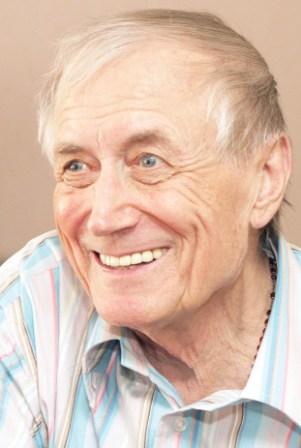
Yevgeny Yevtushenko
At times, Yevtushenko appeared to be a dissident, at other times he appeared to collaborate with the regime. As Robert Conquest put it,
| The writers who had briefly flourished [under Khrushchev’s thaw] went two different ways. Solzhenitsyn and his like into silenced opposition; Yevtushenko and his like, sometimes reluctantly, sometimes in the hope of still influencing matters a little, into well-rewarded collaboration. |
Yevtushenko says that he criticized Khrushchev to his face. More recently, Yevtushenko supported the reformers Gorbachev and Yeltsin. In 1989, Yevtushenko served in the Soviet Parliament.
Known for his many affaires de coeur, Yevtushenko has been married four times. In addition to writing poetry, Yevtushenko has acted in films, directed films, and taught film history. In recent years, he has taught in American colleges, dividing his time between the U.S. and Russia.
© L. James Hammond 2015
feedback
visit Phlit home page
make a donation via PayPal
| Footnotes | |
| 1. | Wikipedia. “In the Town of Berdichev” was made into a movie. It can be found in a book called The Road: Stories, Journalism, and Essays. back |
| 2. | The Road: Stories, Journalism, and Essays, p. 314, by Vasily Grossman, commentary by Robert Chandler with Yury Bit-Yunan back |
| 3. | The Road: Stories, Journalism, and Essays, p. 314, by Vasily Grossman, commentary by Robert Chandler with Yury Bit-Yunan back |
| 4. | The Road: Stories, Journalism, and Essays, p. 302, by Vasily Grossman, commentary by Robert Chandler with Yury Bit-Yunan back |
| 5. | The Road: Stories, Journalism, and Essays, p. 72, by Vasily Grossman, commentary by Robert Chandler with Yury Bit-Yunan back |
| 6. | The Road: Stories, Journalism, and Essays, p. 274, by Vasily Grossman, commentary by Robert Chandler with Yury Bit-Yunan back |
| 7. | Michael Scammell, in a New Republic essay back |
| 8. | In 2002, Richard Rhodes published a book about the “Shoah by bullets,” Masters of Death: The SS-Einsatzgruppen and the Invention of the Holocaust. back |
| 9. | Life and Fate is a sequel to For A Just Cause, which hasn’t been translated into English. For A Just Cause was originally called Stalingrad, and is set during the Battle of Stalingrad. Everything Flows is a short novel. back |
| 10. | The Road: Stories, Journalism, and Essays, p. 314, by Vasily Grossman, commentary by Robert Chandler with Yury Bit-Yunan back |
| 10B. | I came across a good critical essay on Solzhenitsyn’s novella. It’s called “Where Wolves Warm Themselves In The Light Of The Moon: Survival and Grace in Solzhenitsyn’s One Day in the Life of Ivan Denisovich” (by A.E. Smith, The Montréal Review, October 2016). back |
| 10C. | According to the Weekly Standard, the best translation of The Master and Margarita is by Diana Burgin and Katherine Tiernan O’Connor. back |
| 11. | The Road: Stories, Journalism, and Essays, p. 314, by Vasily Grossman, commentary by Robert Chandler with Yury Bit-Yunan. For more on Grossman and Platonov, see p. 187 of The Road. back |
| 12. | Several books by Platonov were published in recent years by New York Review Classics: The Foundation Pit, Happy Moscow, Soul and Other Stories, etc. “Platonov” was a pen name, his real name was Andrei Platonovich Klimentov. back |
| 13. | Apparently an English translation of Foundation Pit was published in 1973. Since then, other English versions have appeared. The best English translation may be Robert Chandler’s, published in 2009 by New York Review Classics. back |
| 14. | Wikipedia back |
| 15. | Mandelstam’s wife, Nadezhda, wrote two volumes of memoirs, Hope Against Hope, and Hope Abandoned. back |
| 16. | Wikipedia. Simon Sebag Montefiore wrote two books on Stalin. He discussed Stalin in a two-hour interview with Brian Lamb (click here for the first hour, here for the second). It’s an excellent interview, but it may be a grim subject to read about. Montefiore says that Stalin’s daughter, Svetlana Alliluyeva, wrote two good books. back |
| 17. | Wikipedia back |
| 18. | Solzhenitsyn later criticized Pasternak for declining the Prize, and for pleading with Khrushchev to remain in the Soviet Union. Solzhenitsyn evidently believed that one should take an uncompromising, uncooperative attitude toward the regime. back |
| 19. | Wikipedia back |
| 20. | Website back |
| 21. | Was Pasternak interested in psychic phenomena? Some of his early poems were described as “hermetic,” and Nabokov spoke of the “vulgar mysticism” in Zhivago. back |
| 22. | Website back |
| 23. | Wikipedia back |
| 23B. | Shostakovich’s 7th Symphony had its St. Petersburg première during the siege. “Most of the musicians were starving, and three died during rehearsals. Supported by a Soviet military offensive intended to silence German forces, the performance was a success, prompting an hour-long ovation. The symphony was broadcast to the German lines by loudspeaker as a form of psychological warfare.” Wikipedia back |
| 24. | Wikipedia back |
| 25. | Quoted in New Republic back |